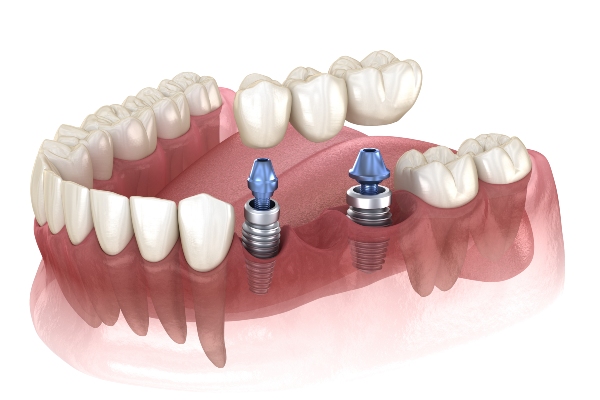 Dental implants are a popular option for people missing one or more teeth. They look, feel, and function like natural teeth, making them an enticing choice for adults needing tooth replacement. Though this option offers many benefits that other teeth replacement options do not, it may not be the right choice for everyone. Let us look at dental implants and what makes someone a good candidate.
Dental implants are a popular option for people missing one or more teeth. They look, feel, and function like natural teeth, making them an enticing choice for adults needing tooth replacement. Though this option offers many benefits that other teeth replacement options do not, it may not be the right choice for everyone. Let us look at dental implants and what makes someone a good candidate.
Dental implants explained
Different variations exist on dental implants, but the basic construction is the same:
1. A titanium post is implanted into the jaw bone to act as the replacement root.
2. An abutment is attached to the top of the implant post.
3. The dentist covers the abutment with a porcelain crown, completing this tooth replacement option.
A single implant can support one tooth or several teeth. If an entire arch of teeth needs replacing, 4 to 6 implants can support a denture. In addition to being versatile, a key advantage of the dental implant lies in its titanium post. Unlike other tooth replacement options, the post continues stimulating the jawbone, preventing the bone loss that often comes with tooth loss. Also, thanks to the stability of dental implants, the patient does not have to worry about the tooth replacement shifting out of place. Instead, they can talk and chew like they normally would with natural teeth.
Who is a good candidate
There are key characteristics that make someone a good match for dental implants. Here is a closer look at these key characteristics:
Adequate jawbone
A leading requirement for dental implant surgery is adequate jawbone support. A person’s jawbone must be strong and dense enough to support the implant. However, if this is an issue for someone, there are options. A patient can undergo bone grafting surgery or find a style of implant that does not require the same jawbone density.
Good general and dental health
Patients receiving dental implants need to be healthy enough for surgery. In addition, they need healthy gums and surrounding teeth. Any issues with gum disease need to be resolved before beginning this treatment.
Commitment to the process
Getting dental implants is not a quick fix. In most cases, the process can take months. First, it takes several months for the titanium post to integrate into the jawbone in a process called osseointegration. Next, if bone grafting is needed, months can be added to the process. Therefore, it is important for patients to understand that the process can be lengthy and involve multiple procedures.
Good dental hygiene
The patient must have good dental hygiene habits. This includes brushing and flossing and carefully cleaning around any dental work. Peri-implantitis is a gum infection similar to periodontitis that can occur in those with dental implants who do not properly care for their mouths.
Are you a candidate for dental implants?
Dental implants are an excellent tooth replacement choice for healthy adults with good oral health habits. If you are missing one or more teeth, dental implants can help you restore your smile. To learn more about dental implants, contact our team to learn more.
Request an appointment or call Summit Family & Cosmetic Dentistry at 908-516-3833 for an appointment in our Summit office.
Related Posts
Dental implants are the most stable dental restorations you can get. The invasive procedure will cut through your gum tissue. The dentist will drill into the jawbone and place titanium rods into the holes. The right kind of care is important to make sure that the implant site is free from infections. Here are the…
Dental implants are effective, long-lasting artificial teeth. Implants are surgically attached to the jawbone to look and function like natural teeth. As a result, patients can chew, talk, and laugh without worrying about dentures slipping. They also improve oral health. This article explores when and why to get implants and the qualifying factors for treatment.Patients…
Many types of dental implants are available. There are also many ways to attach them to your jawbone and gums. Working with your dentist can determine the right implants. Here are the different types of dental implants that are right for your dental needs.These restorations have titanium rods that the dentist inserts into the jawbone.…


